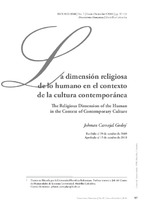La dimensión religiosa de lo humano en el contexto de la cultura contemporánea

View/Open
Date
2010Author
Carvajal Godoy, Johman
xmlui.dri2xhtml.METS-1.0.item-type
article
Citación
Metadata
Show full item recordDocuments PDF
Abstract
Este texto trata de demostrar que la religión –en general- es un elemento constituyente de las sociedades contemporáneas, a pesar de la extremada racionalización de las diversas formas de pensamiento del siglo XVIII, del triunfo del pensamiento científico en el siglo XIX y la enorme secularización del siglo XX desde la misma ciencia, la política, la economía, la literatura y la filosofía. Esto es, inversamente a lo que se preveía – una nueva centuria atea, arreligiosa y extremadamente racionalista nuestro tiempo ha visto un nuevo retorno a la religión, regreso marcado por nuevas espiritualidades, afianzamiento de credos tradicionales y radicalismos y extremismos religiosos, con los cuales debemos convivir día a día. This paper tries to demonstrate that religion, in general, is a constituent element of modern societies, despite the extreme rationalization of the various forms of eighteenth-century thought, the triumph of scientific thought in the nineteenth century and the massive secularization of the twentieth century from science, politics, economy, literature and philosophy. That is, inversely to what was expected -a new century atheist, irreligious and extremely rationalistic-, our time has seen a return to religion again; return determined by new spiritualities, strengthening of traditional faiths and radicalism, and religious extremism, with which we live day by day.
Keyword/s
Religión
Secularización
Política
Economía
Extremismos
Religion
Secularism
Politics
Economics
Extremism
Collections
- No. 7 (2010) [13]
The following license files are associated with this item:

